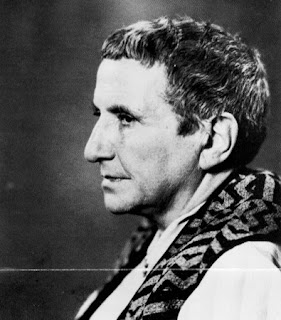Today we're moving on to the second Mary Butts piece, "From Altar to Chimney Piece." Hopefully it will make a little more sense than "Brightness Falls." Last time I forgot to give a bit of background, so here are the basics now, right from Wikipedia: she was a British modernist writer and lived from 1890 to 1937. After her death, her work fell into obscurity, revived in the 1980's with the reprinting of her memoir. She lived in Paris for much of the same time period as Stein, and it is with post-WWI Paris that "From Altar to Chimney Piece" begins.
The first few pages of the story describe the quarter of Paris known as Montparnasse, and it sets up a clear conflict. We're introduced briefly to Vincent, a young man (an English soldier, we're led to believe) who falls in love with a female-personified Paris, specifically Montparnasse. It serves as a "supreme tonic" for the health of body and spirit:
"He found a quarter in a princess of cities where people were being good because they were being happy, because, after the lost years, a small tide of earthly joy was rising gently in that place. Or winding in and out of it like a little stream no evil thing could cross. A place where, even if people suffered, a touch of rapture, as though the pain was about something real, a necessary part of something like immortal life. A place where men and women were beginning to live again, beginning to make up for the years that the War had taken" (234-235).These people are the artists and the lovers and they love the old delights: "love of a party, work, solitude, study, indolence, or an exhilarating row. Love of loving Paris, of good wine, good food; love of one's friends, one's enemies, one's beloved. The lovers went..." (236) and with them the tonic provided by Montparnasse. They're replaced by "imitators and failures" who effectively create a tourist trade:
"parasites on all the arts and all the passions, the men and women harlots and the fashionable purveyors of sexual excitements disguised as art. And with these, their panders, not of social or sexual tastes, but the neurotic vices which follow fashion and have nothing to do with desire. Also the men and women whose hell had not been occasioned by any dislocation of our society, but by the putrid state of their subconscious selves, occasioned by fear, by over-indulgence and sometimes by the intolerable repression of american life." (236).
These parasites are seeking the tonic, but instead of adapting themselves to the quarter they adapt the quarter to them, completely defeating the purpose.
After this introduction, we return to Vincent, and his life is described as never quite full after the War: "He did his duty as a small country gentleman, kept up his classics, his science, his contemporary letters, his friends. Had neither--and he noticed the omission--either love-affairs or any work that implied creation. Not up to the limit of his powers. [...] "They castrated me, after all," he used to tell himself" (238). Though gentle, he's no hero, no extraordinary figure.
There's an anecdote of a dream Vincent has where he is a fish explaining why he doesn't mind that he's unemployed, and as he runs away, he turns into the little mermaid from the original Hans Christian Anderson story, for whom walking on two legs was like walking on knives: "But that was for love's sake. For what love was he bearing a life-time's loss of honorable employment? For a love which had left the earth?? Gone off somewhere behind a space-time curtain into the inconceivable?" (240). Very interesting.
The next sentence is: "It was this that drew him and his friends to artists." This, this sense of absent but still influential love. Montparnasse and the lovers and artists there were his tonic, his answer to what that missing love was: remember the list of "old delights" quoted above. Or perhaps he envies the artists for their "essential health." It seems that Vincent is sometimes envious of full people and their ability to live: "He sneered, as near as he ever came to a sneer, at [life] and his inability to yield to it" (242).
The rest of the story goes something like this: Vincent meets an American girl named Cherry, falls for American girl, loses American girl to a bad crowd, moves on with his life. Interestingly, though, the bad crowd meets in a salon like the ones Stein and her brother would hold for the famous and would-be famous artistic and literary figures of Paris. Is Mary Butts implying that Gertrude Stein was some kind of evil gang leader? Hard to tell.


No comments:
Post a Comment